As useful as a spider
- frida@artyardbklyn.org

- Feb 17, 2023
- 6 min read
This evening ART YARD Advanced Studio met in person at The Morgan Library & Museum where we viewed all of the exhibitions currently on view.
We started with She Who Wrote: Enheduanna and Women of Mesopotamia, ca. 3400-2000 B.C. a selection of artworks that depict women’s lives in ancient Mesopotamia during the 3rd millennium We were particularly intrigued to learn about a remarkable woman who wielded considerable religious and political power, the high priestess and poet Enheduanna (ca. 2300 B.C.), the earliest-named author in world literature.
We also loved Uncommon Denominator, Nina Katchadourian a series of “conversational pieces the artist created after discussing favorite and meaningful objects from the Morgan collections with museum staff." The range of artworks on view is vast from photos of moss reminiscent of maps, to cut photo albums, cut paper sculptures to photographs of book titles which make up hilarious found poetry.
We wrapped up in the Morgan's library rooms, then holding critique on a curved marble bench in what would have been the entry hall to the library.
We started the week in ART YARD Advanced Studio on Zoom is a great session with ART YARD Artist Jane Huntington inspired by the work of Louise Bourgeois, in particular her spiders. A microcosm which fits perfectly into our Year of Planet Earth.
Jane explained that she is a huge fan of Louise Bourgeois work and that she loved developing a lesson in which she could share some of her work with the Advanced Studio Artists. Further elaborating that while many seem to be a tad squeamish when it comes to arachnids, that Bourgeois stated that they remind her of her mother and that they are in fact quite useful in that they eat mosquitoes which carries disease. Explaining that she chose the spider as a subject because its traits reminded her of her mother, Bourgeois elaborated “She was deliberate, clever, patient, soothing, reasonable, dainty, subtle, indispensable, neat, and as useful as a spider”.

Jane also showed us interpretation of spiders and webs by other artists including Odilon Redon, John Kenn Mortensen, and Luc Viatour. Finally asking us to consider: “What do spiders remind you of? Then to make a spider in any medium that is a symbol of something or someone that is important to us personally."
Work by (left to right) Odilon Redon, John Kenn Mortensen, and Luc Viatour.
Ed elaborates: “I chose to depict a wolf spider. These large, hairy beasts inhabit forests throughout the USA. The project brought me back to my childhood in Minnesota. Back then, my passion was entomology. In fact, my life's goal was to become an entomologist. In the course of collecting insects, I encountered many arachnids, including wolf spiders. I knew they hunted, trapped, and ate my beloved insects. The gigantic wolf spiders are solitary hunters. They can swim, and will hunt tadpoles, minnows, and other aquatic denizens, as well as terrestrial bugs, beetles, flies, and mosquitoes. They have a nasty bite, complete with venom that can kill small prey. They can survive cold autumn nights in Minnesota because they are insulated with long hair.
There are over forty-five thousand species of spiders world-wide, compared with on million species of insects. It's impressive that spiders evolved alongside their prey and occupy an important niche in our environment. They really help keep insects under control.”

It turns out that Abby is also a keen insect lover, and her work, like Ed’s, shows a great deal of detail and knowledge. The same to be said of Ajani’s painting which portrayed several types of spiders.


Karla writes: “I was inspired by Louise’s admiration for her mother and her symbolic use of the spider in possessing those same loving and caring attributes. Her sculptures of spiders are so overwhelmingly enveloping! I enjoyed everyone’s interpretations in so many different mediums! Karla created her work in paper, cut paper, collage.
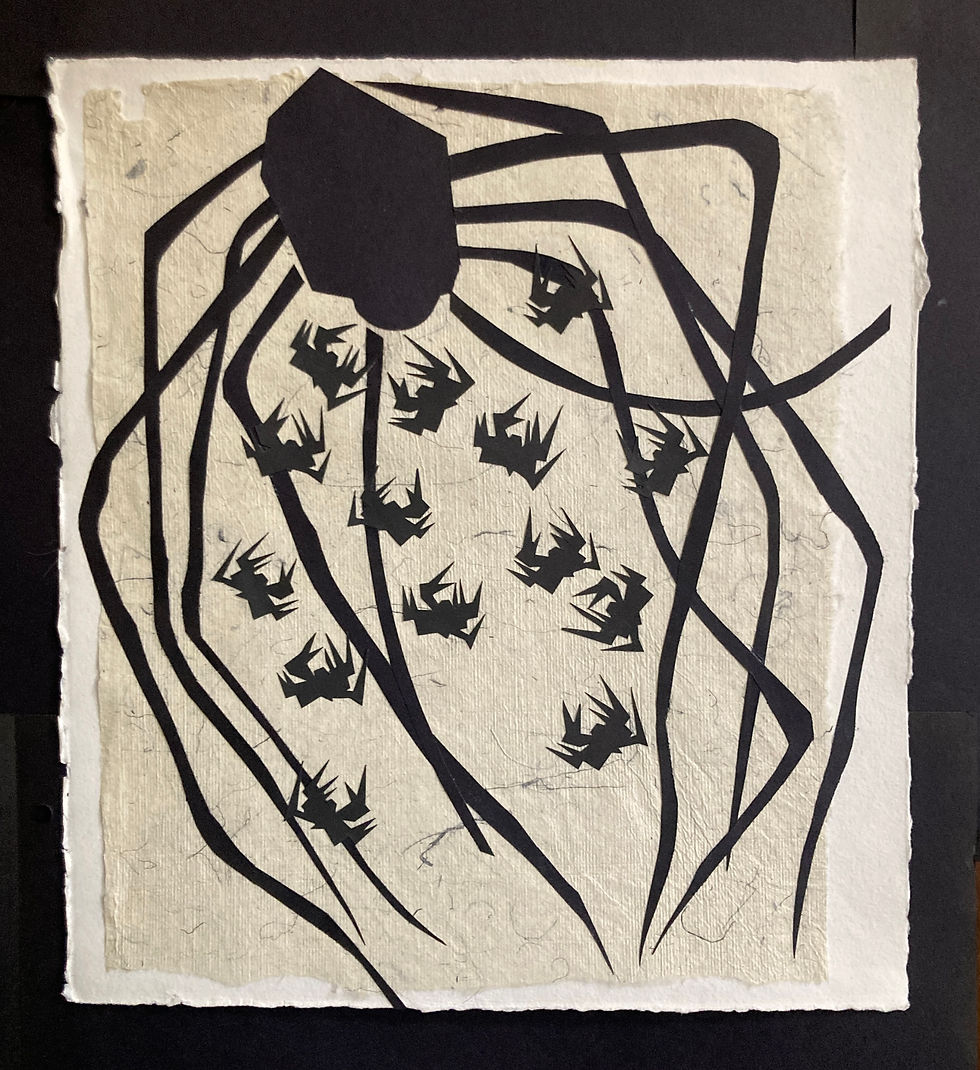
Vera and Marilyn, like Louse Bourgeois referenced Mama as Spider.


Maraya and I had our hands stand in as spiders creating webs. I made a reference to web sculptures I made years ago with gold thread, with a sewn image of my hands playing the childhood game of Cat’s Cradle.

Maraya explains her video Spider TightRope: “Spiders are the original tightrope walkers. With precision and skill they carefully balance between two worlds, the natural and the spiritual. They are unique to humans in the sense that they create their rope (web), as well as, perform.
Maraya Lopez, Spider TightRope

Avan and Jane both investigated spidery movement articulating the legs and gesture. Avan, including poetry in a vertical orientation which called attention to his use of paint drips.


Pat pointed out that actual webs are subject to gravity, draping depending on their location. Her web drawing does not rely on the same forces of nature.

Imala really hit a home run with her conceptual piece of a spider drawing on lined notebook paper, which equates the tedium of weaving to the mindless sketching while note taking one might do during a class then crumple before the evidence is found. This also reflects the careless way that humans often treat insects.

Sigrid’s lovely window painting of spider webs uses color splendidly to convey mood and atmosphere.

Tuesday and Thursday things went well for participants in ART YARD Art Matters at The East New York Hight School of Arts and Civics.
Dennis reports: “Thorough (and thoughtful) critiques were held at our partnership school, The East New York School of Art and Civics, this week - one at the beginning of the lesson (a break from the norm, for us) on Tuesday. These changes in critique schedules proved to be positive as students, although in the midst of working on their pieces, found it helpful to discuss and hear what others had to say.

Teaching Artist Fatima Traore offered pointers/suggestions - from her personal style of painting - while never asking artists to do something other than what they'd planned. This week, Fatima demonstrated how painting the sides edges of the canvas helps to make a piece look complete - basically continuing or wrapping the painting around all four sides of the canvas. Students jumped at this idea and went straight to work on doing so right after critique.
During critique, all canvases were lined up 'shoulder to shoulder' to fit on one table - which prompted Miss M to comment that they looked like a giant collage and might be a smart idea to exhibit them this way. GREAT SUGGESTION and it very well might happen. This led to students' participation in re-arranging the pieces, as a whole, and thinking of a title for the piece. More to come.
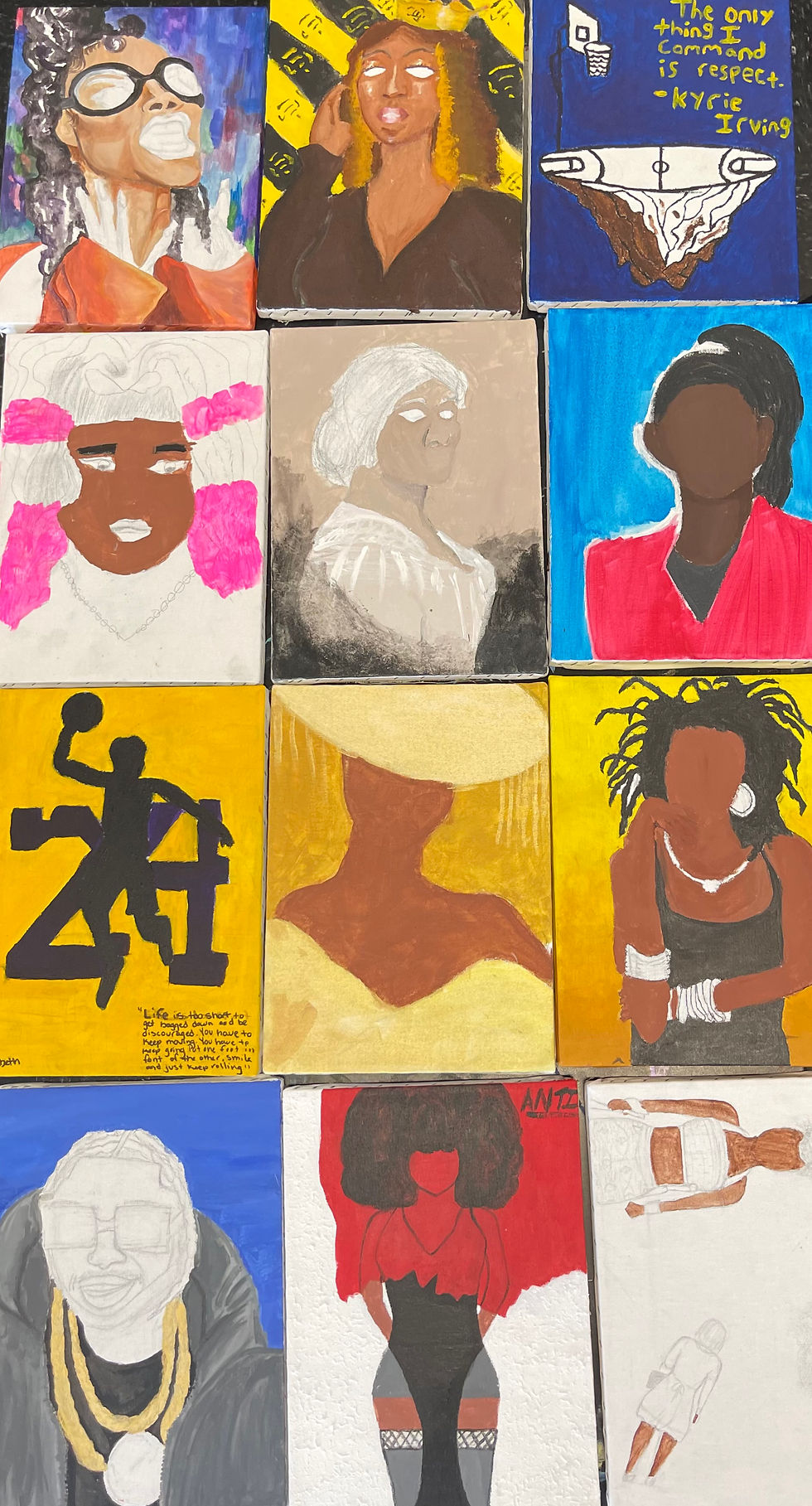
Printed images were made available to students for inspiration. Joshua accepted the challenge of painting a portrait of Louis Armstrong - with the idea that his horn might be painted in metallic gold. Smart thinking on Joshua’s part!

Tiara’s very sensitive drawing of James Baldwin is now in its painting stage. Fatima guided Tiara in paint mixing (gray scale) to achieve the black and white style of the original photograph.
Portraits of Madame C. J. Walker and James Baldwin in progress
NYC schools are in hiatus next week for mid-winter excess - these portraits will be continued or completed the following week.
Today Dennis, Fatima and Sarah were making their magic happen with ART YART Art Matters at PS 6.
Dennis summarizes: "Teaching Artists Fatima Traore and Sarah Gumgumji created a list of fun facts about teeth for the final segment of our Purposeful Tooth lessons at our partnership school PS 6 in Jersey City.
Classes in action at PS 6
While several students finished up their pieces from last week, others moved on to a new project. After selecting a fun fact (or one that they knew that wasn’t on our list), students created what became an interactive art piece. They folded a 9x12” paper in half creating a tent card, of sorts.
With a “did you know” or similar question on its front cover, students (using careful lettering) wrote out their fun fact and illustrated their works with pictures of the related animals (or sometimes humans) on the inside.
Fun Facts Drawings
There were snails, snakes, pit bulls, tigers, and giraffes - in watercolor and/or colored pencil. One interesting fun fact was: “rabbits, squirrels, and various rodents have teeth that never stop growing”, which means they need to find something to gnaw on the keep their teeth filed down.
Completed student paintings

On another note, upon our arrival to the school, after announcements and the pledge to the flag, we heard a song over the PA system written and performed by 4th graders in celebration of Black History Month. It’s great!
Other Art News
Join ART YARD Teaching Artist Iviva Olenick and other Winter Workspace residency artists at Glyndor Gallery at Wave Hill in the Bronx on Sunday, February 19th, 1PM to 4PM for open studios.

🕷🕸🖤













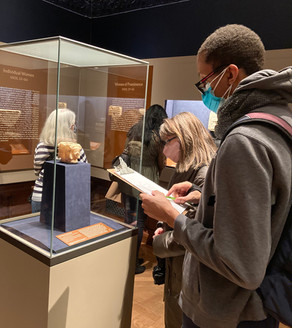















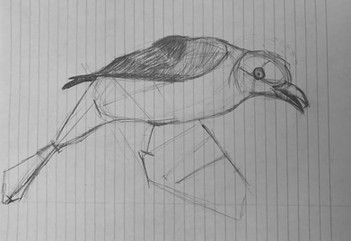







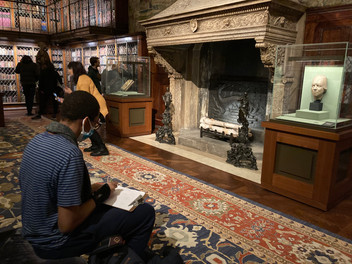
























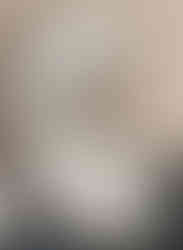








































Comments